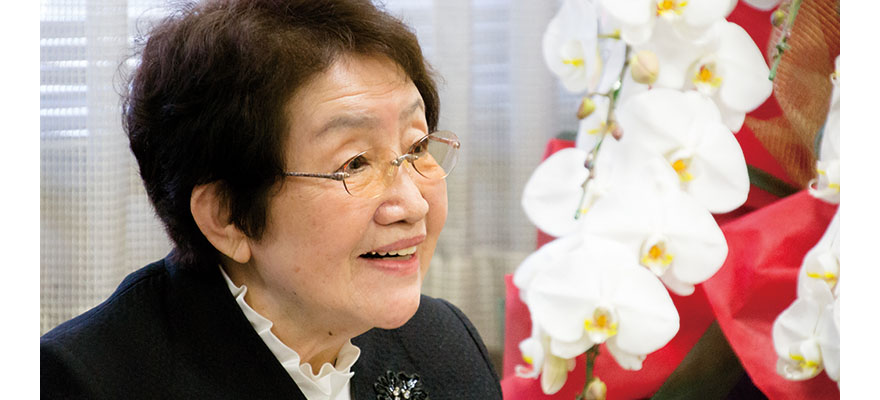Home > Highlighting JAPAN >Highlighting Japan January 2014>Leaning In - The Power of Womenomics -
Highlighting JAPAN
Leaning In - The Power of Womenomics -
Interview:
Makiko Arima
Japan's contribution to gender equality and the empowerment of women

Makiko Arima, president of the Japan National Committee for UN Women, is one of the country's foremost experts in the field of women's rights and international development, and is equally knowledgeable in the areas of children's safety, health and education. For more than a decade, she served as the Japanese government's representative to the UN Commission on the Status of Women. We spoke with her about advocating gender equality and Japan's contributions to the cause.
The advancement of gender equality and the empowerment of women have long been focal points for Japan and the international community, perhaps most clearly outlined in the United Nations' Millennium Development Goals (MDGs). How would you assess progress in this area to date?
The MDGs are eight global objectives that address concerns from eradicating poverty to curtailing the HIV/AIDS epidemic. Gender equality is also put forth as one of the world's primary concerns, but the topic is in no way exclusive to the others. All of the issues are interrelated and connected to the problems faced by women and children around the world. In fact, 70 percent of those in poverty are said to be women. The strategic promotion of gender equality, the eradication of poverty – all of these concerns must be tackled simultaneously.
The promotion of gender equality has progressed most in recent years within the realm of primary education, which is the second of the eight goals. For instance, according to the according to the United Nations Development Programme (UNDP) report, imbalance in the ratio of girls to boys in elementary levels of schooling has improved notably. Technological and medical innovations have also aided our endeavors in providing more sophisticated, region-based healthcare to women and children.
In Prime Minister Abe's speech to the UN General Assembly in September 2013, he revealed that Japan would be working more actively towards the advancement of women in society. What are your thoughts on this proposal? Furthermore, how would you evaluate Japan's involvement with the empowerment of women up until now, and what do you expect for the future?
Prime Minister Abe's statement illustrates a genuine interest in backing the transformation of women into economic powerhouses and key players in contemporary society. The endorsement of concrete goals such as women's active participation in peace-building processes or the elimination of violence against women in conflict-torn regions further indicates his intent to expanding Japan's commitment to newer spheres of international aid. I believe the sincerity of his pledge demonstrates that Japan is prepared to approach the next step in its support of international development.
Government agencies and NGOs in Japan have been dedicating their energies to a wide variety of development programs, and many of these institutions have become very adept at maximizing our national strengths. One organization, for example, trains women to become teachers, with the aim of fostering female role models and leaders to inspire young students, thus providing an immediate boost in equal accessibility to education. When it comes to providing assistance to developing regions, I believe it's more effective for nations to contribute to fields in which they excel. For example, with Japan boasting significant achievements in prenatal healthcare and pediatrics, domestically developed techniques of monitoring pregnancies and early childhood care are being actively shared abroad.
One of the most memorable projects funded by the Japan National Committee for UN Women was proposed by the Barefoot College and its founder, Sanjit 'Bunker' Roy. Working together in southern India, we were able to provide women surviving on low incomes in areas without electricity, with enough training in solar engineering to build their own small-scale photovoltaic power system. These women took the skills that they acquired back to their hometowns, spreading the use of renewable energy at the grassroots level. The project also advanced the social standing of women by exposing those involved to employment opportunities and a means of escaping poverty. With electricity connected to their homes, families no longer have to resign themselves to dining in darkness, while women and children can now learn to read and write, even after sundown.
I strongly feel that advocacy and aid initiatives do not operate in a single direction. I myself had the experience of learning that literacy means more than simply knowing how to write one's name. The skills of reading and writing enable a woman to navigate bus routes, or judge whether a tin can delivered among relief supplies contains milk or pesticide. It was through my involvement with people on the ground that I realized that literacy is a matter of life and death. We continue to learn much from the individuals whom we support. International assistance will always be an open dialogue, a continuous sharing of ideas across the world.
© 2009 Cabinet Office, Government of Japan






